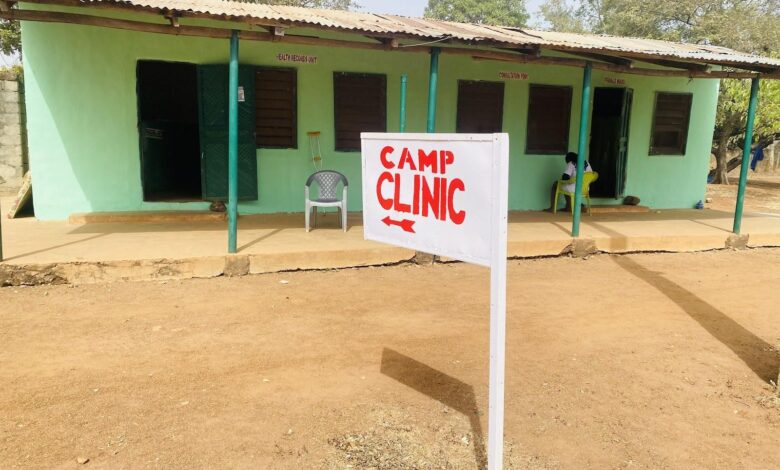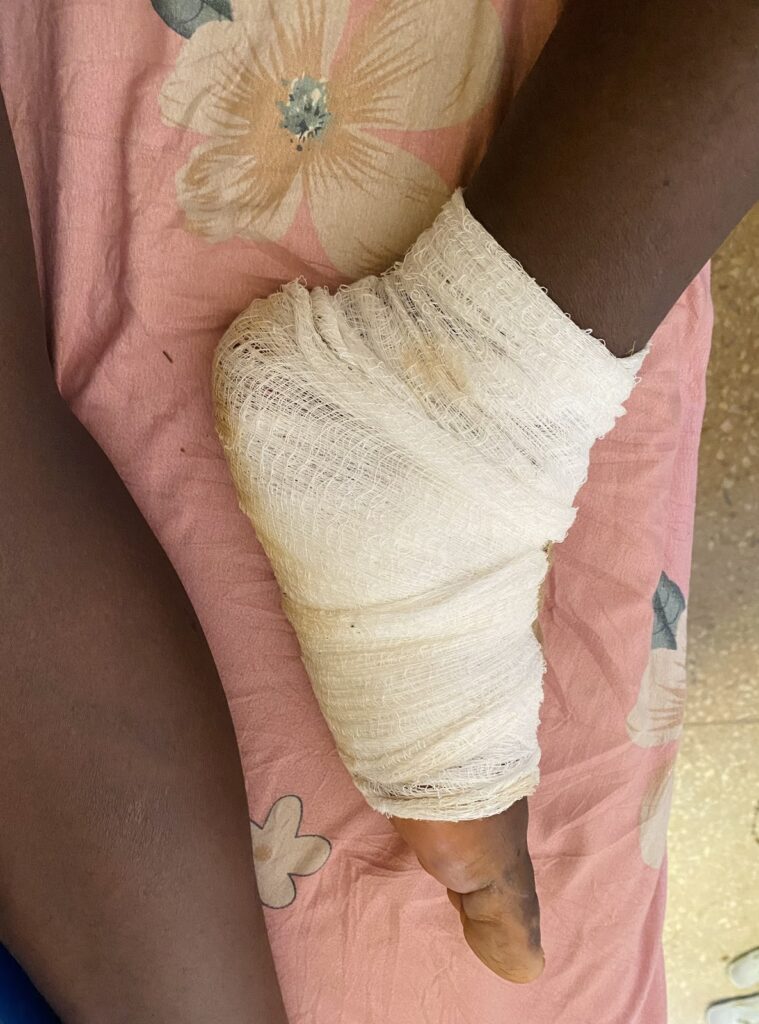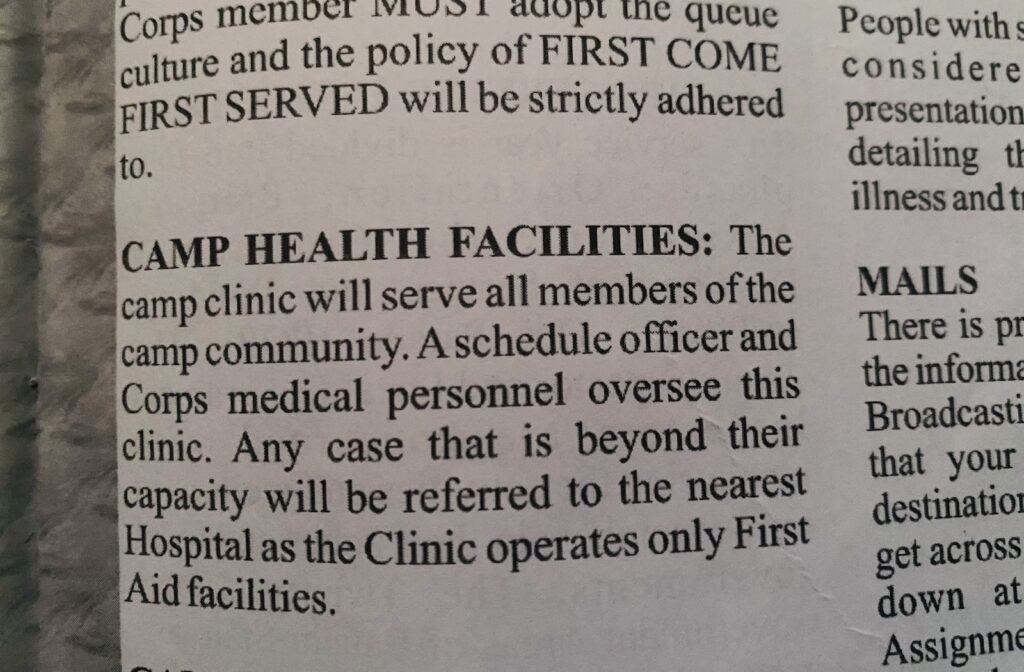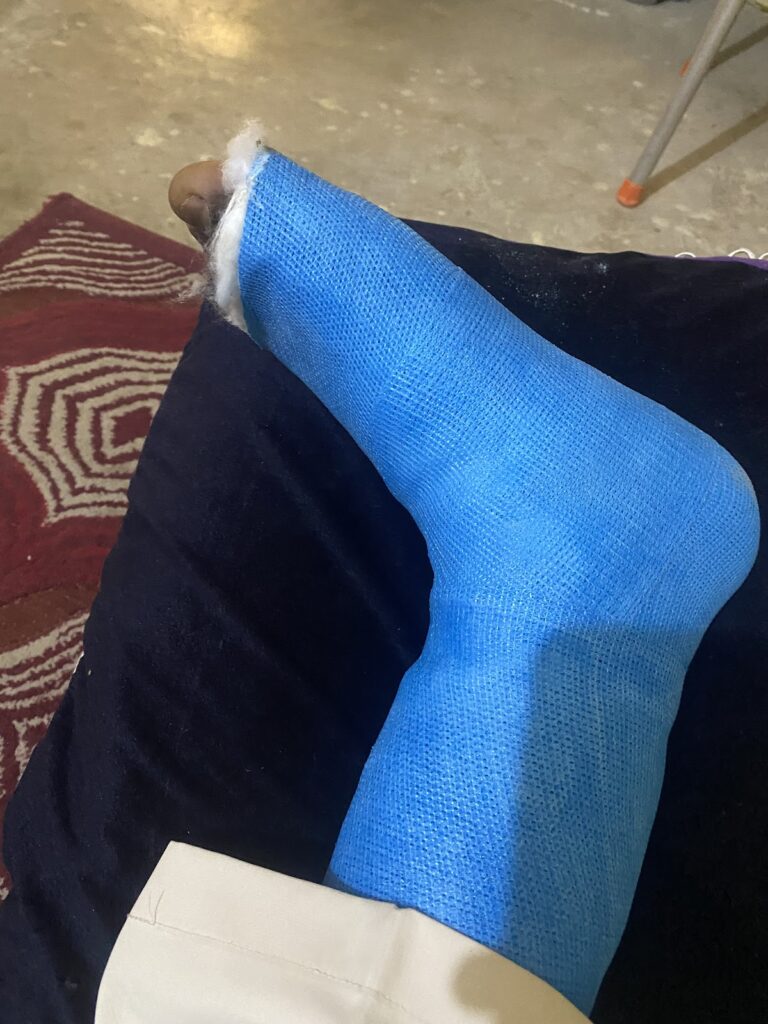Corps Members In Bauchi State Are Lacking Access To Medical Care
In 2016, a presidential directive ordered the enrollment of corps members in the National Health Insurance Program, following the unfortunate death of some serving corps members in Bayelsa, Zamfara, and Kano states. However, things are different for 1,700 Nigerian youths posted for the mandatory three-week orientation camp in Wailo, Bauchi State.

On Nov. 24, 2023, Mustapha Kyari was deployed to serve in Bauchi, North-East Nigeria, under the mandatory National Youths Service Corps (NYSC), which Nigerian undergraduates are required to participate in. He packed his things and went for the initial three-week paramilitary camping stage of the programme.
One day in December 2023, at about 4:30 a.m., Mustapha fell from his top bunk bed while sleeping in one of the camp hostels and injured his foot.
“I landed on my twisted leg when I fell and immediately heard a loud cracking sound. As I reached down to touch my foot, I felt the top part of my left foot moving uncomfortably and unnaturally. I knew immediately that something was seriously wrong,” he recalled.
He realised he had sustained a significant injury. Unfortunately, he found the clinic closed when he went. He struggled his way back to his bed, anxiously waiting for dawn for medical care.
As the clock ticked, Kyari suffered in excruciating pain, longing for the arrival of morning and the potential support it could offer. Eventually, at 6:00 a.m., he trudged to the clinic with the help of a colleague, only to realise that doctors at the clinic would not be around until 8:00 a.m.
Kyari managed to hobble to the clinic again by 9:30 a.m., where a medical doctor, Wali Abubakar, who is also a corps member at the orientation camp, attended to him. The doctor applied analgesic ointment on his swollen foot, wrapped it with a bandage, and took him to the staff doctor for further consultation.
Kyari was asked to see a physiotherapist for an x-ray of the leg on account that there were signs of fracture. However, the NYSC medical staff at the camp would rather ask him to leave the camp.
“The first thing they told me was to go home. I was terrified by their response and told them I could not travel back home with this injury and that the injury should be attended to before I travelled back to Borno State,” he said.
“I am surprised they don’t have a physiotherapist in the camp, and physical drills and sports are conducted every day,” he added. “I read all the guide pamphlets we were given at the camp; all I can see is free medical treatment.”
The camp management told him the clinic was built only for first aid, noting that any treatment or case beyond their capacity would be referred to the nearest hospital. Kyari requested to be taken to an established hospital in Bauchi city for treatment, but the doctors insisted he should go back home, as they couldn’t transport him to town “just because of this injury”.

The three-week orientation camp incorporates intensive military drills with inherent risks of potential injuries. In 2016, a presidential directive ordered the enrollment of corps members in the National Health Insurance Program, following the unfortunate death of some serving corps members in Bayelsa, Zamfara, and Kano states. However, things are different for 1,700 Nigerian youths posted for the mandatory three-week orientation camp in Wailo, Ganjuwa Local Government Area of Bauchi State.
Meanwhile, Kyari remained adamant that he deserved to be properly treated. He was told he would be referred to the Bauchi Teaching Hospital, after which they gave him crutches. When he waited for hours with no message from the authorities, he reminded the officials about the earlier assurance that the NYSC would cover all medical expenses from the beginning of camp until the completion of their service year. But the response from one of the medical officials shocked him.
“Are you not a Nigerian?” he remembers her asking him.
“I was very confused and told her, what do you mean?” Kyari recalled responding.
“Don’t believe and do what the teacher says,” the official continued.

During his visits to the clinic, Kyari recalled, a sick corps member had received several intravenous drips before regaining consciousness. Later, he was instructed to return home and seek medical attention there, as the responsibility for his condition was deemed to be his own.
Hailing from Kebbi, which is about 13 hours away by road, he was urged to leave immediately. The corps member was warned that if he chose to stay and his illness worsened, he would be solely responsible for his medical treatment.
As per the National Youth Service Corps (NYSC), NHIS coverage is provided to corps members starting from the collection of call-up letters through the 3-week orientation camp until the completion of the service year. This program, known as the Group Individual Family Health Insurance Programme (GIFSHIP-n), is tailored for mobilised and serving corps members throughout their service duration.
“I informed the camp official that I had the right to be transported to the hospital as my medical expenses are covered by the National Health Insurance Scheme (NHIS). The official labelled me stubborn for refusing to go home. I even emphasised that not everyone has someone at home to handle their medical expenses, and the NYSC advises against travelling home due to security concerns. Yet, they still insisted on sending me back home,” he added.
The next day, Kyari’s case was forwarded to the camp director, who asked him to write an undertaking stating that whatever happened to him was nobody’s fault. “I tried telling them that all I need is treatment. What if I get sick while serving?” he asked.
Other corps members who camped in Bauchi complained about the poor medical attention given to them. Ngozi Ada, a corps member who fell ill during her service, was advised to return home for treatment. However, Ngozi expressed concerns about the lengthy and arduous journey, fearing that her health might deteriorate further. Despite her pleas to stay and receive medical attention at the camp, the medical team remained adamant, asking her to leave.

Ngozi reluctantly left the camp with her belongings. This marked the final encounter between Ngozi and fellow corps member Kyari.
After incurring medical expenses exceeding ₦100,000 on his treatment, Kyari was compelled to return to his primary place of assignment (PPA). “I had no choice but to travel back again to Maiduguri for a follow-up at the hospital, as the medical facility in my PPA lacks a physiotherapy department,” he said.
Kyari alleges that when he reached out to the NYSC Bauchi State Coordinator, seeking assistance for his ailment, he was told she would not be able to offer any assistance. According to Kyari, the state coordinator gave only two options to Kyari: Return home and seek medical treatment on your own or submit a written agreement absolving the NYSC of any responsibility for your leg injury.
Another corps member, simply known as Peter, said he was diagnosed with Malaria and told to buy drugs because he was not enrolled by the NHIS. Peter said: “It was at that moment that I missed home, seven months without seeing my family, and I couldn’t get medicine, which is just N5000.”
According to data published by Statista, Nigerians usually have to pay for medicine out of pocket. Often, the medicine is expensive and difficult to afford. Data on health insurance coverage show that only 1.4 per cent of people living in rural areas had health insurance. Overall, insurance coverage in Nigeria is very low. In particular, among individuals without education, the coverage was below one per cent.
The National Health Insurance Scheme (NHIS) and the National Youth Service Corps (NYSC) have signed a memorandum of understanding (MoU) to ensure that every mobilised and serving corps member has access to good healthcare services. This partnership aims to prevent avoidable deaths, protect corps members from financial hardship due to medical bills, and reduce the burden on the NHIS. The program will be available to all mobilised and serving corps members from the date of mobilisation until three weeks after their passing out at the end of the year.
Attempts to communicate with the officials were unsuccessful. Despite diligent efforts, the emergency contact information outlined in the NYSC service guide for corps members was not reachable.
Support Our Journalism
There are millions of ordinary people affected by conflict in Africa whose stories are missing in the mainstream media. HumAngle is determined to tell those challenging and under-reported stories, hoping that the people impacted by these conflicts will find the safety and security they deserve.
To ensure that we continue to provide public service coverage, we have a small favour to ask you. We want you to be part of our journalistic endeavour by contributing a token to us.
Your donation will further promote a robust, free, and independent media.
Donate HereStay Closer To The Stories That Matter




